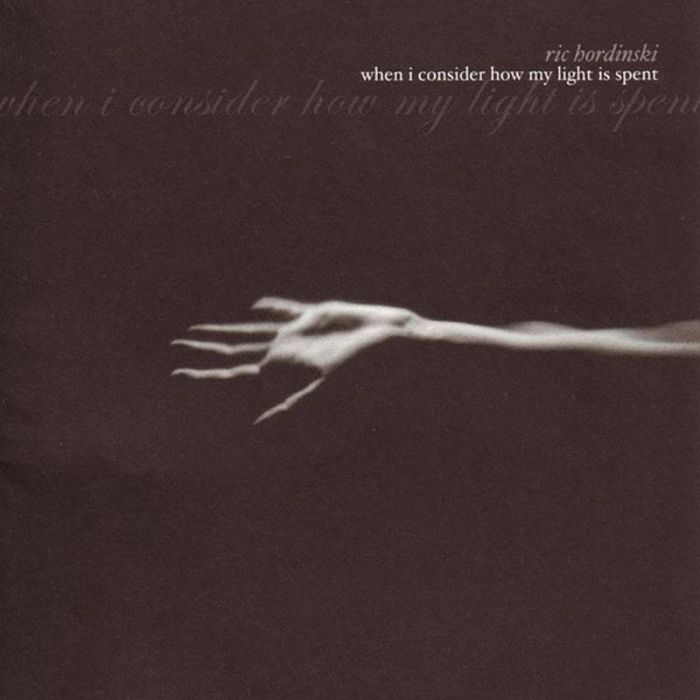When I Consider How My Light Is Spent by Ric Hordinski (Review)

I first became familiar with Ric Hordinski’s music through his work as one of Over the Rhine’s founding members. He played with that celebrated group for 8 years, and when you go back and listen to albums like Patience and songs such as “Jacksie,” it’s obvious that his subtle, yet atmospheric guitar work was just as fundamental to their music as Karin Bergquist’s sultry voice or Linford Detweiler’s poetic lyrics.
After leaving Over The Rhine, Hordinski recorded several solo albums under the Monk moniker. Although I’d always wanted to check his solo material out — I’d stop by the table everytime I saw it in the Cornerstone merch tent — I never got around to it for some reason or another. And so I was excited and interested when When I Consider How My Light Is Spent, his first solo album recorded under his own name, showed up in the mail.
Admittedly, I wasn’t sure what to expect, though deep down I was probably looking for something akin to Linford Detweiler’s solo albums. But to be perfectly frank, When I Consider… is more along the lines of a watered down, AC version of Daniel Lanois’ wonderful Shine.
Within 30 seconds of starting When I Consider…, it’s readily apparent that Hordinski is a skilled player, and as a result, the album is rife with lovely, emotive guitar textures and filigrees. “Any Second Now” begins the album on a lovely note, with the wavering, silvery tones of Hordinski’s guitar meandering about in a gentle, sylvan manner hemmed in only by Josh Seurkamp’s brushed drums — altogether, the song perfectly complements the lovely black and white photography that adorns the sleeve artwork,
But for an artist who, according to his bio on Paste Music’s website, is “the rarest kind of virtuoso — one who knows when not to play… and what not to play,” Hordinski often weighs his songs down unnecessarily, usually in the form of extraneous guitarwork, but also vocally and lyrically. It takes place throughout the disc. Every song starts off wonderfully, but something often takes place that suddenly takes me out of the song and prevents it from being truly engaging.
“Middle Way” picks up where “Any Second Now” leaves off, opening with hazily picked guitar tones that mesh perfectly with Hordinski’s hushed vocals, and the more uptempo rhythms, courtesy of Seurkamp and Brian Kelley’s drumming and David Labruyere’s bass, give the song a boost. And yet despite being “heavier,” it still retains Hordinski’s keen sense of atmospherics. However, that’s upset as unnecessarily aggressive, fiery guitarwork begins to filter throughout the song, culminating in Phil Keaggy’s hot, David Zaffiro-esque solo that, rather than adding additional heft to the song, actually undercuts its subtle appeal.
But perhaps the best example of this trend occurs on what should be the album’s crowning, most exquisite moment. “If Angels” starts off beautifully, with angelic drones and atmospherics enveloping the fragile notes of Hordinski’s acoustic guitar. However, Hordinski slowly piles on the sap, either through cloying, Bono-esque lyris (“I’ve been a rich man/Because I’ve known real love/Yeah it’s true/If angels can witness/I can only wish this for you”) or excessively dramatic guitar soloing.
By the song’s end, what could have and should have been the album’s most intimate moment becomes the sort of tearjerker theme that newlyweds might pick to accompany the sappy photo slideshow they’ll show at the reception — or that plays during one of those WB melodramas when characters have a “moment” and collapse, sobbing, into each other’s arms.
“Dover Beach” is the one song on the album where this doesn’t happen, and it works precisely because of that. Although the lyrics flow in the same romantic, pining style as the rest of the album (“Love let us be true/Every single moment/Each and every heartbeat/As we learn to fall headlong into now”), they work because the music isn’t trying to drown us with “feeling” and “emotion” as is the case with the other songs (e.g., “If Angels”). Rather, it flows easily and naturally, enveloping and drawing in the listener. Even Phil Keaggy’s “lead” guitar is nicely restrained here, adding some very haunting textures… in the background.
“Dover Beach” notwithstanding, I find myself drawn much more to the album’s instrumental moments, when it doesn’t feel like Hordinski has to achieve any sort of emotional crux and allows his music to flow freely — and as a result, lets it develop an emotional heft that feels completely natural.
Belying its lighthearted name, “Ping” is the album’s darkest and most obtuse track, a seductive, swirling mass of wintry drones and icy synths that evokes the spectre of Aarktica’s No Solace in Sleep. By contrast, “Sabina” is one of the album’s most relaxed moments; Hordinski seems to wax nostalgic as he picks away at his acoustic guitar (probably while propped up on the back porch of some rundown cabin), playing as the sunset drenches everything in golden light. All that’s missing from the song is the sound of crickets and the rustling of a light summer breeze.
Having heard When I Consider…, I’m actually more intrigued to check out Hordinski’s work as Monk. There’s much that I do like about When I Consider…, but it’s in the subtler, more restrained moments. I’d love to find more of that aspect of Hordinski’s ouevre, because that’s where his music’s truest and most captivating spirit seems to lie.